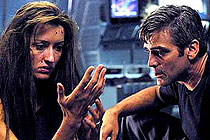|
|
|
|
Solaris
|
 |
|
In
Steven Soderbergh’s version of Stanislaw Lem’s classic science fiction novel Solaris, space travel scarcely figures.
Virtually in the blink of an eye, Chris (George Clooney) has been transported
from the melancholy world of his psychiatric practice to the even more troubled
station of Prometheus, where the few remaining scientists struggle with
inexplicable demons.
Solaris is better known to many, of course,
as a 1972 film by the Russian master Andrei Tarkovsky. But it is a tribute to
Soderbergh’s achievement that, while watching his rendition of the story, I
never once made the mental comparison with Tarkovsky. This Solaris, fundamentally different in so many respects to
Tarkovsky’s, stands up on its own.
Soderbergh
is interested neither in the epic sweep of most screen science fiction nor
Tarkovsky’s preferred mystical themes. His film is about subtle disturbances of
reality which lead to a confrontation with the absolute strangeness of both
Self and Other. In its intensity and focus, it is by far the best movie
Soderbergh has signed since King of the Hill (1993).
Dropping
Lem’s and Tarkovsky’s investigation of the hero’s past family life, Soderbergh
reworks the bare plot material of the story into a spooky and enthralling
investigation of the nature of romantic love, at times reminiscent of
Hitchcock’s Vertigo (1958). Once Chris has fallen under the psychic spell emanating from
the planet Solaris, he finds his wife, Rheya (Nastascha McElhone), resurrected
before him.
On
earth some years before, Rheya had committed suicide after a severe bout of
depression. Soderbergh takes the risk of evoking, in concentrated flashbacks,
the dramatic arc of their relationship, from early bliss to late malaise. What
the film lacks in conventional, psychological depth it makes up for in mood and
suggestiveness.
On
Prometheus, Soderbergh takes a boldly minimal approach to the story. There are
only two other characters, the spaced-out Snow (Jeremy Davies) – who begins
virtually every mumbled comment with either “the thing is … “ or “uh, about
that …” – and the rather more paranoid Gordon (Viola Davis). We never see the
beings-from-the-psyche with which they have struggled. There is a Gothic,
behind-closed-doors aspect to this tale which is used very effectively.
In
fact, the story of Solaris is
something of a throwback to the snake-pit movies of the
Solaris systematically and stealthily blurs
the dividing lines between past and present, rationality and irrationality,
flesh-and-blood reality and psychic fantasy. Although Gordon briefly conjures
the fear at the heart of much science fiction – will They take over the human
race? – Chris, and through him Soderbergh, is much more interested in being
immersed in this borderless realm of experience.
No
one in this film is especially real. The character of Gibarian (Ulrich Tukur),
who sets off the narrative, is present only as a figure on a computer screen.
In an especially brilliant touch, Soderbergh and his sound team record and mix
Clooney’s deep, quiet voice in such a way that it never seems to belong to his
body, but floats instead in and between scenes. Clooney finds a way to invest
this highly immaterial character with an enormous range of feeling.
The
craft that has gone into this movie is astonishing, and mercifully a universe
away from the hit-it-and-run experimentation of Soderbergh’s previous Full Frontal (2002). The finesse of Solaris is
evident in its pared-down set design, its carefully controlled colour palette,
and in the selective use of Cliff Martinez’s mesmerising score: about twenty
minutes of the story go by before we hear its first note.
There are a few
moments in Solaris when Soderbergh
seems to be indulging in flashy, Mulholland Drive-style games of alternate
universes and the like. But for the most part, the film protects its deepest
mysteries. On a second viewing it grows richer, and details that may irk the
first time through (such as Snow’s behaviour) become a meaningful part of the
whole.
For
all the sadness and occasional terror it generates, this Solaris ultimately offers a contemplative beauty, and even a kind
of euphoria. In its fix on the intimate saga of a couple, and in its
oscillation between dark fatalism and dreams of redemption, it reminded me of
that unsung masterpiece of contemporary science fiction, Douglas Trumbull’s Brainstorm (1983).
It
is to Trumbull’s film, rather than Tarkovsky or Kubrick’s 2001 (1968), that we should turn to
understand Solaris – since both are,
in inspired ways, dramas of remarriage and second chances.
MORE Soderbergh: Erin Brockovich, The Limey, Ocean's Eleven, Fallen Angels, The Underneath, Traffic, The Knick, High Flying Bird © Adrian Martin February 2003 |
![]()